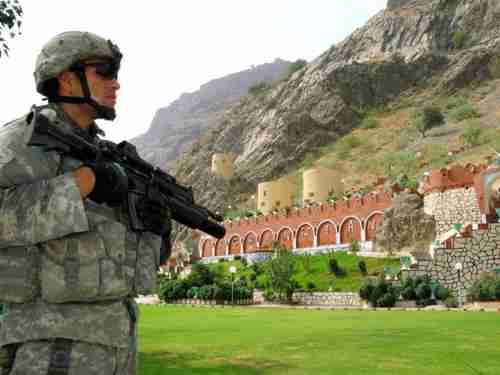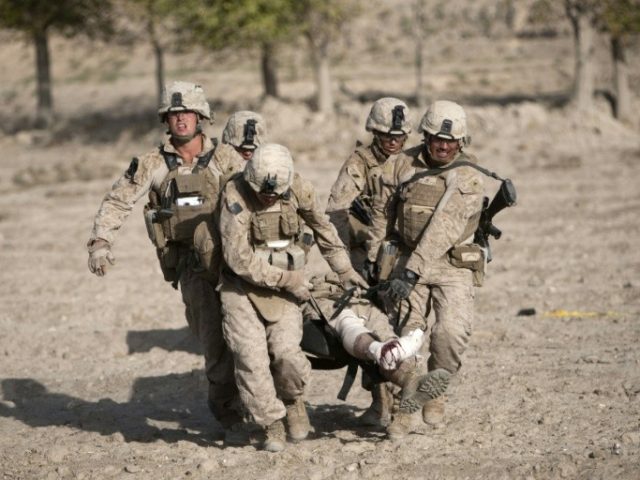This morning’s key headlines from GenerationalDynamics.com
- Trump considers new troop surge and strategy change in Afghanistan war
- Generational analysis: Afghanistan war versus Iraq war
Trump considers new troop surge and strategy change in Afghanistan war

American soldier at the Afghan border
According to a number of reports, President Donald Trump is considering a plan to send an additional 3,000 to 5,000 American troops to Afghanistan for a new “troop surge.” These would add to the 8,400 US troops already there, as well as 300 Nato troops.
The reports indicate two changes in strategy.
First, the troop levels would be heavily conditioned on the ability of Afghan President Ashraf Ghani to weed out ineffective military commanders and reduce corruption.
Second, the troop surge would be combined with a new military strategy to threaten the Taliban with defeat so that they would return to the negotiating table.
Both of these conditions are laughable. Afghanistan is entering a generational Awakening era and Ghani has less political control than ever over dissident forces. And the Taliban will never agree to a peace agreement. They may attend so-called peace talks, but only for the purpose of providing political cover for continuing the war, and for conducting further terrorist attacks, particularly against Shia Muslims. This is similar to Syria’s president Bashar al-Assad who uses peace conferences and peace agreements as political cover to continue dropping barrel bombs with chemical weapons on innocent Sunni Muslim women and children. Military.com and Washington Post and Business Insider
Related Articles
- CENTCOM commander: Afghanistan ‘stalemate’ requires ‘thousands’ more US troops (11-Mar-2017)
- ISIS claims responsibility for attack on Shia Hazaras in Kabul Afghanistan (24-Jul-2016)
- Troubles mount for Afghanistan government as US withdrawal looms (12-Apr-2016)
Generational analysis: Afghanistan war versus Iraq war
I’ve written about this a number of times, starting in 2009, when President Obama was considering what strategy to use in Afghanistan. He eventually decided on a “surge” in Afghanistan leading to a troop strength of 100,000, but it was a complete farce, with repeated flip-flops on troop withdrawals, and laughable attempts at peace talks with the Taliban.
President Bush’s 2007 troop “surge” into Iraq was highly successful. Al-Qaeda in Iraq was driven out and the country was at peace, although many claim that the peace was squandered by President Obama’s withdrawal two years later.
So it is very tempting to try to repeat the Iraq troop surge in Afghanistan. In fact, Obama did try that, with complete failure, as I predicted in 2009. So now Trump is considering the same thing and the prediction that it will end in total failure is the same. To understand this, let’s look at the difference between the Iraq and Afghan wars from the point of view of generational theory.
Both countries are in generational Awakening eras, having had relative recent generational crisis wars — the Iran/Iraq war of 1980-88, and the Afghanistan civil war of 1991-96. Both of these wars were horrendously bloody, ending in a genocidal climax that brought peace to the respective countries for a time.
But the Iran/Iraq war was an external war, with an external enemy, Iran. In fact, in Iraq’s last two crisis wars – the Great Iraqi Revolution of 1920 and the Iran/Iraq war of the 1980s, Sunni and Shia Iraqis banded together against the foreign enemy, the British in 1920 and the Iranians in the 1980s. They did not fight each other. Thus, Abu Musab al-Zarqawi and al-Qaeda in Iraq were able to stir up sectarian violence for a while, but al-Zarqawi had to import fighters from Jordan and Saudi Arabia because the Iraqis refused to fight. Eventually, the Iraqis themselves turned against al-Qaeda in Iraq, and threw them out. My 2007 analysis of the war in Iraq was the best analysis written by anyone at that time and explained all this in detail.
Even today, Iraq is fighting an external war. the so-called Islamic State (IS or ISIS or ISIL or Daesh) is a coalition of foreign jihadists from 86 countries around the world, most of whom came to Syria to fight Bashar al-Assad. Right now the Iraqi army (ironically with the help of the Iranians) is attacking the last of Iraq’s ISIS fighters in Mosul. There have been some flare-ups of Iraqi Shias fighting Iraqi Sunnis, but that’s not the main thing that’s happening in Iraq.
But none of that is true of the Afghan war. The 1991-1996 war was a civil war, fought between the Pashtuns in southern Afghanistan versus the Northern Alliance of Tajiks, Hazaras, and Uzbeks in northern Afghanistan. The Taliban are radicalized Pashtuns, and when they need to import foreign fighters, then can import their cousins from the Pashtun tribes in Pakistan – which is in a generational Crisis era, and in which the Taliban are conducting regular terrorist acts.
The fact that the Iraq war was an external war, while the Afghan war was a civil war means that the two wars have absolutely nothing in common. To apply the strategy of one of these wars to the other is disastrously wrong.
Indeed, it is much worse than that. The Pashtuns still have scores to settle with the Tajiks, Hazaras, and Uzbeks that formed the Northern Alliance, especially the Shias. The Taliban may sit in on peace talks to gain political cover but they will never, under any circumstances, agree to a peace deal, no matter how large the American troop surge. To believe anything else is pure fantasy. US News and Vox and Politico
Related Articles
- Obama flip-flops again on Afghanistan (07-Jul-2016)
- Analysis of Afghanistan vs Iraq wars (26-Sep-2009)
- Iraqi Sunnis are turning against al-Qaeda in Iraq (01-Apr-2007)
KEYS: Generational Dynamics, Afghanistan, Ashraf Ghani, Pashtuns, Taliban, Afghan civil war, Northern Alliance, Tajiks, Hazaras, Uzbeks, Iraq, Iran/Iraq war, Great Iraqi Revolution, Abu Musab al-Zarqawi, al-Qaeda in Iraq, Islamic State / of Iraq and Syria/Sham/the Levant, IS, ISIS, ISIL, Daesh
Permanent web link to this article
Receive daily World View columns by e-mail

COMMENTS
Please let us know if you're having issues with commenting.